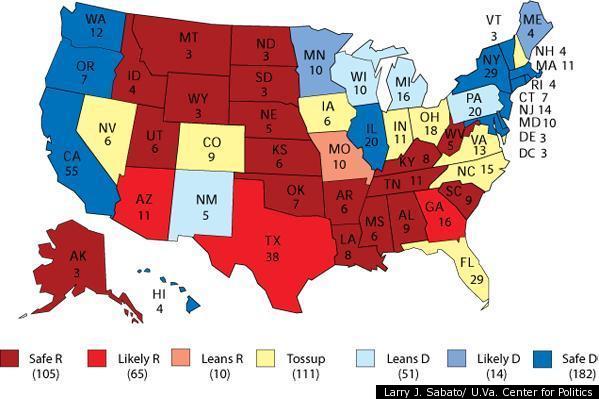
Oh boy, oh boy, oh boy! Sound the alarums! Larry Sabato has an electoral college map -- the first for 2012! -- for us to masticate, digest and, much later, expel from one end of our alimentary canal or another, depending on taste. Let's begin by noting that Sabato basically urges everyone to not start getting crazy about this:
With 18 months to go until November 2012, there is exactly one use for a current projection of the 2012 Electoral College results. This is merely a baseline from which we can judge more reliable projections made closer to the election. Where did we start-before we knew the identity of the Republican nominee for president, the state of the economy in fall 2012 and many other critical facts?
I promise you, his urgings will be in vain! But okay, here's the shocking baseline:

If you'll notice, the "battlegrounds" are Nevada, Colorado, New Mexico, Iowa, Missouri, Wisconsin, Michigan, Indiana, Ohio, Florida, Virginia, North Carolina, Pennsylvania and New Hampshire. Savvy election watchers will recognize most of these states as being "where the battleground always is anyway, so, whatever."
For fun, let's review what happens in the event of a 269-269 tie or if the No Labels Bipartisan Robot secures enough votes to prevent anyone from taking 270 votes, in accordance with the 12th Amendment to the Constitution.
Should this happen -- and should no "faithless electors" emerge to switch a vote -- it would fall to the House of Representatives to determine the winner of the presidential race. But there's a twist! Each state's delegation to the House would have to vote "en bloc" -- which means each state gets a single vote. That, of course, means that in theory, this could get hung in a 25-25 tie. The smart decision would have been to allow the District of Columbia to have a vote as well, but guess what? D.C. always gets screwed. And so the balloting would continue on and on until it's resolved. (A quorum of two-thirds of all the state delegations would be necessary for these activities to take place.)
Electing the Vice President would happen in the same way, except, for some reason, it falls to the Senate to determine the winner. The Senate is limited in that its members only get to choose from among the top two vote-getters in the Electoral College (the House, in determining the president, are allowed to consider the top three). Each Senator gets a vote, which means there's a possibility of a 50-50 tie. Normally, the sitting vice president would decide these deadlocks, but for reasons that should be obvious, doesn't get to do so in this case. (A debate rages among legal nerds over this matter.)
Just to note, the Congress that would be making these decisions would be the newly elected one. The "en bloc" voting complicates matters: if your state voted to elect a Democrat, and you are a Republican, do you vote along partisan lines or do you respect the will of the voters in your state. (SPOILER ALERT: Such votes will definitely be cast along partisan lines!) And yes, this situation definitely allows for the possibility of a president from one ticket being elected to serve with the vice-president from another.
So, in short, this is what you'll want to root for if you'd like to see American politics devolve entirely into a hilarious crap-show.
In the event that the winner of the popular vote is not the winner of the electoral college, that candidate will get an "I participated" ribbon and his or her supporters will limply call for reform of the electoral college system, and then be ignored entirely, because the big winner in American politics is always status quo bias.
Would you like to follow me on Twitter? Because why not? Also, please send tips to tv@huffingtonpost.com -- learn more about our media monitoring project here.
